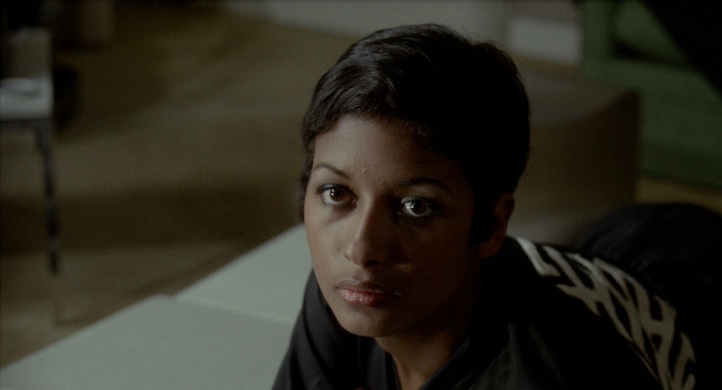Film Forum Celebrating an Essential Actor, Alain Delon, and a Cinematic Masterpiece, ‘Le Samouraï’
A new 4K restoration of the movie is being shown leading into a 10-film series dedicated to the French actor. The title of the program, appropriately enough, is ‘Delon.’

What movie starlet of yore stated that she would never appear in a film with Alain Delon because it wouldn’t be right if the male lead were more beautiful than the heroine? My memory tells me Janet Leigh, a factoid left unconfirmed by a cursory internet trawl. Whatever the case, the handsomeness of Mr. Delon — he’s still with us, by the way, at 88 years of age — has never been in question, nor, for that matter, the comeliness of his leading ladies.
Among the actresses who have held their own with Mr. Delon are Romy Schneider, Claudia Cardinale, Jeanne Moreau, and Monica Vitti. Nathalie Delon, the actor’s wife at the time, features significantly in “Le Samouraï” (1967), as does the model-turned-actress Cathy Rosier. Film Forum will be hosting a new 4K restoration of the movie leading into a 10-film series dedicated to the French actor. The title of the program, appropriately enough, is “Delon.”
“Le Samouraï” is, by general consensus, a cinematic masterpiece. It’s also been bandied about as the best work done by both Mr. Delon and the picture’s director, Jean-Pierre Melville. The latter call is arguable, what with both men having resumes whose accomplishments are numerous and significant. Still, there’s no denying the staying power and fluency of this, likely the best of the three films Mr. Delon made with Melville. Almost 60 years after the fact, the movie still holds fast.
Delon is Leo Costello, a hitman who plays his cards close to the vest — very close. We first see him, if just only, reclining in an expansive apartment: an exhalation of cigarette smoke announces his presence at the bottom right of the screen. The room is weathered and worn, as gray as pewter. Wan light filters in through the windows. A lone caged bird peeps. Costello is, as we soon find out, as sere as his surroundings. The production design by François de Lamothe is immaculate in its textures, colors, and concision.
The plot is simple in its trajectory and exacting in its particulars. “Le Samouraï” is as choreographed and crisp as an MGM musical. Costello makes a hit, gets snagged by the police, and then engages in a lengthy game of cat-and-mouse, both with the law and with his employers. We watch as Mr. Delon’s character sets up his alibis, makes his numerous getaways, and, on the whole, puts two-and-two together. Hardly a word is spoken — this is among the least wordy of sound films. In its mechanics and focus, Melville’s film is reminiscent of Buster Keaton’s “The General” (1926).

No one should go in mistaking “Le Samourai” for a comedy, but it is a film made with consummate wit. The script by Melville and Georges Pellegrin allows for a spiky vein of parody, particularly when Costello’s intelligence takes on an almost Obi-Wan Kenobi prescience. Although one would hate to dub the proceedings postmodern, there is a degree of self-awareness in the movie’s machinations. The stylizations of Melville’s directing stem from playing with and then deracinating conventions. Not for nothing has Jim Jarmusch cited the Frenchman as an influence.
There’s not a participant in the picture — from bit player to cinematographer to the costumier — who isn’t commenting on the role he or she is inhabiting. Consider a raft of hoodlums playing cards: They’re the Platonic ideals of gangsters, at once true to form and caricatures of the type. As for femmes, they don’t get any more fatale than the impenetrable, implacable, and very beautiful Valérie, a jazz pianist who provides the fulcrum of the picture’s third act. Jane La Grange (Nathalie Delon) is similarly cagey as Costello’s cynical-and-then-some girlfriend. And then there’s François Périer as a police commissioner whose doggedness makes Inspector Javert look like an amateur.
But the picture belongs to Mr. Delon, who, with the capable molding of Melville, takes everything he knows and loves about American gangster films and winnows it down to the barest essence. Stoic beyond measure and possessed of a cool that only begins to crack at the film’s denouement, Mr. Delon contributes a performance that is as knowing as it is underplayed. Viewers can argue whether his determinedly non-histrionic and relentlessly streamlined take on the lone wolf constitutes his finest role. Fortunately for New Yorkers, the revival of “Le Samouraï,” along with “Delon,” offers a splendid opportunity to engage in making just those kinds of distinctions.
Correction: Inspector Javert is the dogged investigator of “Les Miserables.” An earlier version misstated the character’s name.

